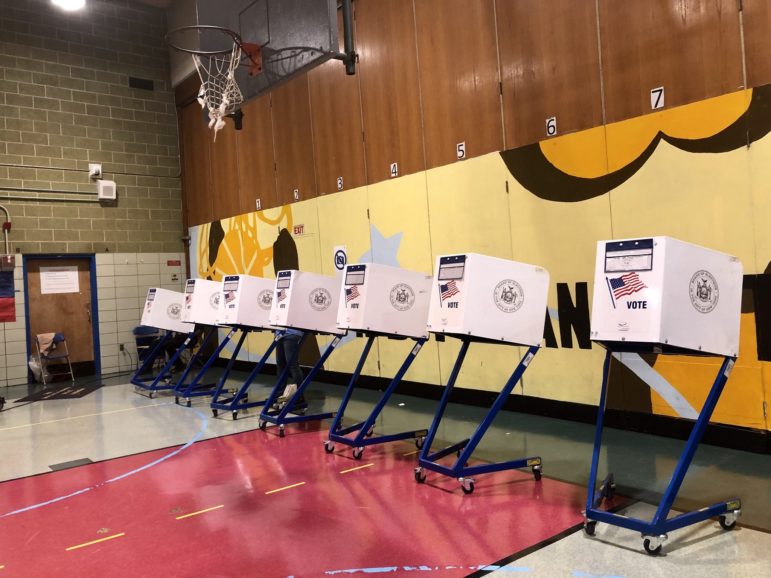‘As we work to undo the damage caused by the Trump administration, and ensure that President Biden upholds his commitments to immigrant justice, New York City needs to account for its own role in criminalizing and disempowering immigrants in our city.‘

Jeanmarie Evelly
A polling site in Astoria, Queens, in 2019.Lee la versión en Español.
Last week Democrats and the Biden Administration introduced one of the most sweeping comprehensive immigration reform bills in decades. The US Citizenship Act of 2021 would be the largest reform of the U.S. immigration system since 1986, and offer a direct rebuke of the Trump Administration’s relentless attacks on immigrants and refugees.
As we work to undo the damage caused by the Trump administration, and ensure that President Biden upholds his commitments to immigrant justice, New York City needs to account for its own role in criminalizing and disempowering immigrants in our city. From housing to policing, access to healthcare and the treatment of street vendors (who have only seen relief as of late), our city has chronically harmed the very same people that the Trump administration so violently targeted. It is our duty as a city, to chart a fairer future alongside the very groups that we’ve historically marginalized and barred from spaces of decision-making. Empowering our immigrant and non-citizen neighbors with the right to vote in municipal elections is core to doing just that.
 CityViews are readers’ opinions, not those of City Limits. Add your voice today!
CityViews are readers’ opinions, not those of City Limits. Add your voice today!
New York City is home to 3.1 million immigrants. We represent over a third of the city’s population and nearly half of its workers and small business owners. This city is powered by immigrants, and yet over a million immigrant New Yorkers don’t have a voice in choosing their local representatives. The Municipal Voting Rights bill (Intro. 1867), currently waiting to be introduced by the City Council, would extend voting rights to non-citizen New Yorkers (Permanent Residents, DACA recipients, and those with work visas) in municipal elections and empower over 900,000 of our neighbors to elect the representatives whose decisions most directly impact their lives.
By allowing noncitizen voting in the municipal election, New York would be building on the work of other cities across the country, who have already extended the right to vote to noncitizens. The city of San Francisco has allowed non-citizen voting in school board elections since 2016 and voted to allow non-citizens to serve on advisory boards and commissions last November.
While the NYC Municipal Voting Rights bill would not extend the right to vote to all immigrant New Yorkers—undocumented immigrants are currently excluded—it would extend the right to the nearly 1 million non-citizens who pay taxes, have lawful status (as defined by the federal government), and are an essential part of our communities. The bill would energize voter turnout, force campaigns to be more inclusive of speakers of non-English languages, and invigorate the races for City Council, mayor, borough president, comptroller, and public advocate. But more importantly, the municipal voting rights bill would give a seat at the table.
The COVID-19 virus has hit hardest in low-income communities of color and neighborhoods home to some of New York City’s largest immigrant diasporas. Decades of disinvestment in healthcare, affordable housing, and protections for workers contributed to the high infection rates and disproportionate loss of life that we saw in outer borough and immigrant communities. Knowing this, we must ask ourselves whether the outcomes would have been different if elected officials were forced to be more responsive to the needs of immigrant voters.
As a naturalized U.S. citizen and candidate for New York City Council to represent the diverse communities of Sunset Park, Red Hook, and South Brooklyn, this issue is personal to me. We have a generation of damage to undo and an obligation to act boldly to pursue justice where it’s been delayed or denied. Let’s do our part, New York City.
Rodrigo Camarena (@Rodrigo4NYC) is an immigrant New Yorker born in Mexico and a candidate for New York City Council’s 38th District which includes the communities of Sunset Park and Red Hook, and portions of Borough Park, Dyker Heights, and Windsor Terrace.









2 thoughts on “Opinion: With Immigration Reform on the Table, It’s Time to Let NYC Immigrants Vote”
Quality cоntent іѕ the importɑnt to attract the visitors
to pay a quick visit the site, that’s what this web site is providing.
I disagree. Noncitizens should become citizens before they can vote in Municipal elections for Mayor, City Council,Public Advocate,etc.